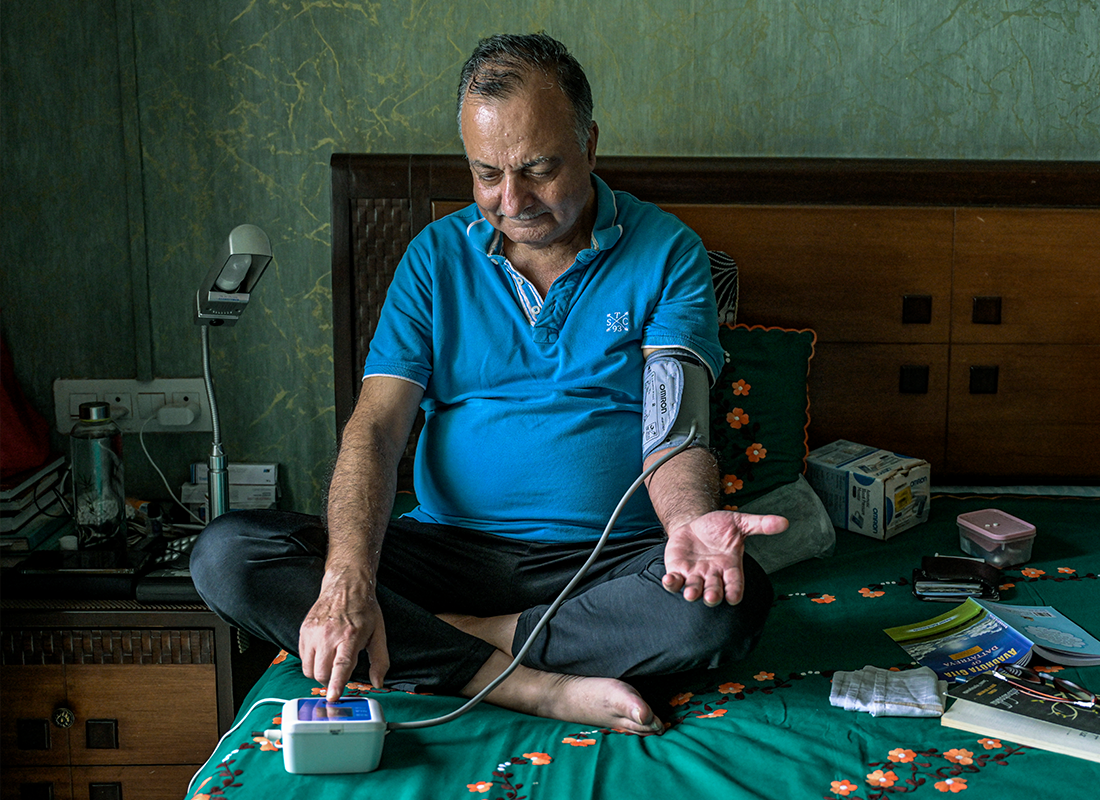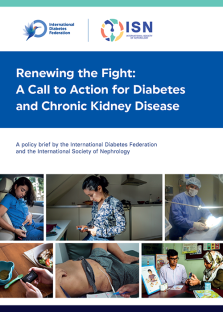Kidney disease (diabetic nephropathy) is caused by damage to small blood vessels in the kidneys, leading to inefficient kidney function or failure. It is more prevalent in people with diabetes. Maintaining normal blood glucose and blood pressure levels can significantly decrease the risk of kidney disease.
In people with diabetes, high glucose levels can damage blood vessels in the kidneys, making them work harder to filter the blood. This impairs their ability to filter waste and excess fluids, which can lead to chronic kidney disease (CKD) and kidney failure. High blood pressure can put further strain on the kidneys, increasing the risk of kidney disease.

Know the main signs and symptoms of kidney disease:
- Swelling in the legs, ankles, feet, or hands due to fluid buildup (oedema).
- Fatigue and weakness caused by anaemia, resulting from the kidneys’ inability to produce enough erythropoietin.
- Persistent itching due to the buildup of toxins in the blood.
- Foamy urine caused by excess protein excretion.
- Increased need to urinate, particularly at night.
- High blood pressure resulting from fluid and sodium retention.
If you experience any of these signs and symptoms, consult a healthcare professional for further evaluation and guidance.
Chronic kidney disease can give rise to further complications, primarily cardiovascular disease (CVD). People with diabetes are already at risk of cardiovascular complications, and the presence of kidney disease increases this risk.
Managing the risks
Early detection and intervention can help prevent or slow down the progression of kidney disease while maintaining glucose and blood pressure levels at target levels can lower the risk. A diabetes management plan that includes regular monitoring of glucose levels, a well-balanced diet, regular physical activity, and prescribed medications can significantly reduce the likelihood of developing kidney disease. Furthermore, regular medical check-ups to manage kidney function can help detect and prevent or slow kidney damage.
The most common risk factors for CKD are high blood glucose, obesity, hypertension, and blood lipid abnormalities.
Behavioural risk factors
Behavioural risk factors, including poor dietary choices, sedentary lifestyle, smoking and excessive alcohol consumption, can significantly influence diabetes-related kidney disease. Poor nutritional choices include processed foods, sugary beverages and excessive salt, leading to high blood glucose and blood pressure and increasing the strain on the kidneys. A lack of regular physical activity can contribute to obesity and insulin resistance, both linked to an increased risk of diabetes-related kidney disease. Addressing these behavioural risk factors can help delay or prevent and manage diabetes-related kidney complications.
Addressing the needs of at-risk populations
Studies have shown that people from racial, ethnic and minority groups living in Western societies are at higher risk of developing kidney disease. Similarly, women with diabetes have a higher likelihood of experiencing kidney complications compared to their male counterparts. Healthcare professionals need to consider these factors and tailor prevention and management strategies accordingly.
Multi-sectoral approach
Reducing the impact of diabetes-related kidney complications requires a multi-sectoral approach. Healthcare professionals and diabetes educators can be crucial in encouraging healthier dietary habits, promoting regular physical activity, and supporting smoking cessation and alcohol moderation.
Furthermore, advocacy and effective policy implementation can contribute to reducing the prevalence of diabetes-related kidney complications by increasing access to early screening and diagnosis, promoting lifestyle interventions, and ensuring affordable and equitable healthcare for those at risk.
Take control of your kidney health
Early detection and proactive management of diabetes are vital in reducing the risk of kidney disease. Maintaining a healthy lifestyle and working closely with your healthcare team can significantly improve long-term health outcomes.
The power of registries
Diabetes and diabetes complications registries can improve healthcare access and quality and facilitate epidemiological research. The iCaReMe registry is an international observational study that collects real-world evidence on diabetes and cardio-renal complications. Healthcare professionals can access a cloud-based tool to monitor data and follow up with their patients. The registry data are used to evaluate the quality of care, inform policies and raise awareness of risks associated with CVD and CKD.
Related resources

Diabetes and kidney disease

